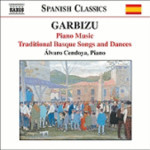
Garbizu: Piano Music / Traditional Basque Songs and Dances
 $25.00
Out of Stock
$25.00
Out of Stock6+ weeks add to cart
TOMAS GARBIZU
Garbizu: Piano Music / Traditional Basque Songs and Dances
Alvaro Cendoya
[ Naxos / CD ]
Release Date: Tuesday 8 August 2006
This item is currently out of stock. It may take 6 or more weeks to obtain from when you place your order as this is a specialist product.
Tomás Garbizu was a constant presence in the musical life of the Spanish Basque Country throughout the twentieth century. He composed many works in a number of different genres, as well as being active as a performer and teacher.
Born in Lezo, Guipúzcoa, in 1901, Garbizu began his musical education in San Sebastián with José María Iraola and Beltrán Pagola, continuing his organ studies in Madrid, and then in Paris with Charles Lebout. From 1954 until his retirement he was organ professor at the San Sebastián Conservatory. His wide-ranging catalogue includes sacred music for organ and chorus, such as Cantantibus organis (1937), Missa cum jubilo (1931), Gure Meza (1967), Triptico al Buen Pastor (1953); piano music; works for txistu (Basque pipe), such as Gure Erria (1967); zarzuelas; tone poems; choral works and many songs. Garbizu drew his inspiration principally from Gregorian chant and folk music. He was a master at taking melodies wholesale and enhancing them in an idiom employing specifically twentieth-century techniques - a variety of harmonic structures, resonance effects and clashes - without ever upsetting the balance of the musical discourse. He was awarded numerous distinctions throughout his career, and died in San Sebastián in 1989.
The Aurresku is a traditional, acrobatic courtship dance, and all its ritual solemnity and elegance are to be found in the Introduction, with its descriptive sketches of pirouettes, in ascending runs of very short notes, and the imitation of the tamboril (small drum), which accompany the melody as it unfolds in a broad register. The traditional salute to and honouring of the lady in question is portrayed in Andreei dei Egiteko, which is followed by a Zortziko, representing the challenge between two male dancers through its two opposing voices in the descant, its aggressive harmonies and a final capriole with a risky chordal leap. Finally we hear a lively Ariñ-Ariñ, based on the motif of the esku-dantza (clapping dance), its accompaniment becoming more and more complex and the imitative drum effects from the first movement being repeated.
The first movement of Bailes vascos, Andantino, introduces an undulating, intimate tune with a marked descending inflexion, and a rhythmic variation on that tune, harmonised by means of chromaticisms and ornamentation. The second, Con decisión, is a biribilketa (similar to a passacaglia) consisting of a restrained melody seemingly suspended in mid-air by harmonic clashes and framed by high and low pedal notes. The final Allegretto is reminiscent of traditional round dances and uses chords to imitate the banging of sticks.
Danzas vascas is a festive suite that follows the pattern of an ezpata-dantza (sword dance), its different pieces featuring both complex and spectacular piano writing. The inner lines of the opening Andantino create a fascinating effect, at times bordering on bitonality. The Allegrettos and second Andantino include passages of subtle harmonic writing, and there are also an elegant Zortziko and Galante before the characteristic celebratory finale in the Tiempo de fandango.
Two original themes appear in Preludios vascos: Eskaria, built on an ecclesiastical mode, with a fast-moving section, and Ipuia, a cantabile melody with wide leaps preceded by a three-part canon. The third piece is based on a well-known song from the French Basque Country known as Adiós ene maitia (Betiko agur), and the fourth, Jostaketan, is a fugal interlude.
The tunes included in Garbizu's Cantos y bailes tradicionales vascos, a selection from J.A. Santesteban's collection of Basque folk-music, are some of the most popular of all time. They include Iru Damatxo, dating back to the eighteenth century; love songs such as Ume eder bat and Nere maite polita; Ezpata-dantzas and Zortzikos; work songs such as the Jorrai dantza; satirical songs, and even tunes borrowed from other types of music, such as Iriyarena, a Haydn minuet translated into Basque folk-music.
Tracks:
4 Preludios vascos (Lau eusko asiera, 4 Basque Preludes)
Aurresku
Bailes vascos (Basque Dances)
Cantos y bailes tradicionales vascos (Traditional Basque Songs and Dances) (Santesteban Collection)
Danzas vascas (Basque Dances)
